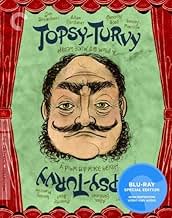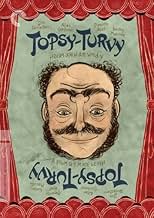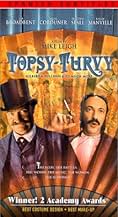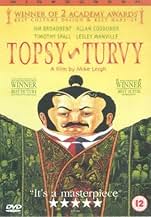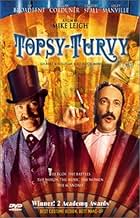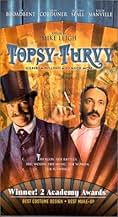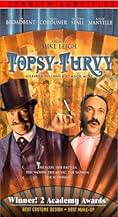Topsy-Turvy
- 1999
- Tous publics
- 2h 40m
IMDb RATING
7.3/10
14K
YOUR RATING
Set in the 1880s, chronicles how during a creative dry spell, the partnership of the legendary musical/theatrical writers Gilbert and Sullivan almost dissolves, before they turn it all aroun... Read allSet in the 1880s, chronicles how during a creative dry spell, the partnership of the legendary musical/theatrical writers Gilbert and Sullivan almost dissolves, before they turn it all around and write the Mikado.Set in the 1880s, chronicles how during a creative dry spell, the partnership of the legendary musical/theatrical writers Gilbert and Sullivan almost dissolves, before they turn it all around and write the Mikado.
- Won 2 Oscars
- 13 wins & 28 nominations total
Bill Neenan
- Cook
- (as William Neenan)
- Director
- Writer
- All cast & crew
- Production, box office & more at IMDbPro
Featured reviews
Gilbert and Sullivan are a successful musical team writing their shows for the Savoy Hotel in London. However Sullivan is tired and is suffering from ill-health. During a bad bout he resolves to no longer write for the Savoy with Gilbert but instead to recover in France and then to strike out alone and write a grand opera. Gilbert meanwhile, is showing signs of fatigue coming up with plots that use the same devices to the same ends. However the two are contractually obliged to continue their relationship, a prospect both seem ill at ease with until Gilbert takes an afternoon off at an exhibition of Japanese culture, sowing the seeds of inspiration for The Mikado.
I honestly had never even heard of this film until the television premier in 2002, if you had told me Mike Leigh had made a film on such subject matter I would likely have laughed down my sleeve at such a suggestion. However I gave this a watch despite the fact I know little (or care little) for the works of Gilbert and Sullivan and worries bout the fact it was 160 odd minutes long! However the plot is sufficiently well delivered to take those who only know a little about the pair to keep up. By taking the snapshot of the Mikado to show their relationship the film takes away what could have been a rough, sprawling epic the snapshot works much better. The weaving of the production into the narrative, rather than all at the end, means that both sets of fans will be happy there is enough music to please those who came for that, but also enough plot within to drive the film.
Leigh does very well, mixing humour and telling drama with the music of the show. The production of the film (and the production!) are both very good and the detail is fine. The cast are all excellent. Broadbent is good as the straight-laced Gilbert and his chemistry with the enjoyable Corduner works throughout. The support cast are all good in singing and non-singing scenes I was surprised to see Spall carrying the tunes so well!
Overall this is a good film but I doubt that Gilbert & Sullivan will be much of a draw even now that it is on TV. However if you have the chance to watch it then you should push through your reservations and give it a try it is engaging and humourous enough to overcome a lack of knowledge (or interest) in the pair's work.
I honestly had never even heard of this film until the television premier in 2002, if you had told me Mike Leigh had made a film on such subject matter I would likely have laughed down my sleeve at such a suggestion. However I gave this a watch despite the fact I know little (or care little) for the works of Gilbert and Sullivan and worries bout the fact it was 160 odd minutes long! However the plot is sufficiently well delivered to take those who only know a little about the pair to keep up. By taking the snapshot of the Mikado to show their relationship the film takes away what could have been a rough, sprawling epic the snapshot works much better. The weaving of the production into the narrative, rather than all at the end, means that both sets of fans will be happy there is enough music to please those who came for that, but also enough plot within to drive the film.
Leigh does very well, mixing humour and telling drama with the music of the show. The production of the film (and the production!) are both very good and the detail is fine. The cast are all excellent. Broadbent is good as the straight-laced Gilbert and his chemistry with the enjoyable Corduner works throughout. The support cast are all good in singing and non-singing scenes I was surprised to see Spall carrying the tunes so well!
Overall this is a good film but I doubt that Gilbert & Sullivan will be much of a draw even now that it is on TV. However if you have the chance to watch it then you should push through your reservations and give it a try it is engaging and humourous enough to overcome a lack of knowledge (or interest) in the pair's work.
10ahab1013
Simply put, a brilliant film.
Topsy Turvy captures Gilbert and Sullivan in the midst of a turbulent period in their partnership. Desperate to be taken more seriously as a composer, Arthur Sullivan attempts to renege on the Gilbert and Sullivan contract with the Savoy Theatre. While his partner William S Gilbert struggles to come up with something new to write about. Each man, in a sense, is longing for individual acclaim but they are trapped in an entity neither one can shake. The fame of their collective energies has taken on a life of its own and the theater crowds want more.
The film is mostly the story of a theater production of the Mikado, one of Gilbert and Sullivan's most famous operas. Director Mike Leigh, notorious for writing on the go, has structured a play within a play to a great delight. Jim Broadbent and Allan Corduner are brilliant as Gilbert and Sullivan, and Tim Spall has a wonderful turn as one of the actors, Mr. Temple.
Their is more here than just two playwrights. The entire cast is seen as more than just pieces of a production. From choristers to administrative personnel, Topsy Turvy is alive with characters. One of the best is Gilbert's long-suffering wife Kitty. Bereft of children and saddled with a husband who doesn't show outward affection, Kitty (Lucy) could be a two dimensional afterthought. However, her pain at being childless is wonderfully played by Lesley Manville. It is clear they love each other but neither is capable of articulating that love, very odd for a man who writes for a living.
Filled with humor and grace, Topsy Turvy is one of the best films about acting and a beautiful embrace of all things theatrical.
Topsy Turvy captures Gilbert and Sullivan in the midst of a turbulent period in their partnership. Desperate to be taken more seriously as a composer, Arthur Sullivan attempts to renege on the Gilbert and Sullivan contract with the Savoy Theatre. While his partner William S Gilbert struggles to come up with something new to write about. Each man, in a sense, is longing for individual acclaim but they are trapped in an entity neither one can shake. The fame of their collective energies has taken on a life of its own and the theater crowds want more.
The film is mostly the story of a theater production of the Mikado, one of Gilbert and Sullivan's most famous operas. Director Mike Leigh, notorious for writing on the go, has structured a play within a play to a great delight. Jim Broadbent and Allan Corduner are brilliant as Gilbert and Sullivan, and Tim Spall has a wonderful turn as one of the actors, Mr. Temple.
Their is more here than just two playwrights. The entire cast is seen as more than just pieces of a production. From choristers to administrative personnel, Topsy Turvy is alive with characters. One of the best is Gilbert's long-suffering wife Kitty. Bereft of children and saddled with a husband who doesn't show outward affection, Kitty (Lucy) could be a two dimensional afterthought. However, her pain at being childless is wonderfully played by Lesley Manville. It is clear they love each other but neither is capable of articulating that love, very odd for a man who writes for a living.
Filled with humor and grace, Topsy Turvy is one of the best films about acting and a beautiful embrace of all things theatrical.
Much has been said here regarding the brilliant costumes, art direction and acting. The one thing I would like to point out is the misconception many have had about the script itself.
Several comments here have claimed that the film is "clunky" in that several scenes apparently added nothing to the film. They also said there was no character development. I think these people need to realize that the depth they seek is contained in the very scenes they wished excised. Which show us all of the different aspects of these characters' lives.
While appearing to be unimportant, empty or simple these many scenes reveal incalculable depth and character insight. The rehearsal scene for just one example, while seeming initially to be a little comedic scene shows us the nature and attitude of both the author and the actors involved in their creative processes.
The performance scenes are also not superfluous as some have wrongly asserted. We can see the characters we have come to know and how they deal onstage with the problems we know they have in their lives: through expressing themselves in their art!!!
In addition the scenes are not arbitrarily strung together but all contain a subtle cause and effect throughline. Sometimes these are reversed as when a cause is revealed only after we have repeatedly seen the effect (as in the revelation of Grossman's illness). Many of the scenes which people have called "tacked on" at the end (like the stunning scene between Gilbert and his wife Kitty) are in fact set up in the earlier parts of the film if you pay close attention and are in actuality a natural progression of these relationships.
Even the very last scene when the leading lady sings is there to show us her identification with the song she is singing and therefore an indirect relationship with her lyricist and composer. This film needs to be seen more than once to appreciate how well constructed it truly is
Several comments here have claimed that the film is "clunky" in that several scenes apparently added nothing to the film. They also said there was no character development. I think these people need to realize that the depth they seek is contained in the very scenes they wished excised. Which show us all of the different aspects of these characters' lives.
While appearing to be unimportant, empty or simple these many scenes reveal incalculable depth and character insight. The rehearsal scene for just one example, while seeming initially to be a little comedic scene shows us the nature and attitude of both the author and the actors involved in their creative processes.
The performance scenes are also not superfluous as some have wrongly asserted. We can see the characters we have come to know and how they deal onstage with the problems we know they have in their lives: through expressing themselves in their art!!!
In addition the scenes are not arbitrarily strung together but all contain a subtle cause and effect throughline. Sometimes these are reversed as when a cause is revealed only after we have repeatedly seen the effect (as in the revelation of Grossman's illness). Many of the scenes which people have called "tacked on" at the end (like the stunning scene between Gilbert and his wife Kitty) are in fact set up in the earlier parts of the film if you pay close attention and are in actuality a natural progression of these relationships.
Even the very last scene when the leading lady sings is there to show us her identification with the song she is singing and therefore an indirect relationship with her lyricist and composer. This film needs to be seen more than once to appreciate how well constructed it truly is
George Martin once talked about he and John Lennon once having a drink in a British pub. One of the regulars went over to the jukebox and selected "Yesterday." Lennon sighed, turned to Martin and said, "Don't suppose anyone's going to put in 'I am the Walrus?'" Martin went on to suggest that as frustrated as Lennon was of Paul McCartney's "Granny Music," he also couldn't deny McCartney's talent and the ease with which he came up with unforgettable melodies.
One senses the same kind of rivalry between Arthur Sullivan and William Gilbert in Mike Leigh's "Topsy-Turvy." Gilbert and Sullivan were both famous for their hilarious musical comedies in the mid to late 1880s, especially their early hits "H.M.S. Pinafore" and "The Pirates of Penzance." But the film takes place later in their career and things are not boding well for the duo. Sullivan (Alan Corduner) is growing increasingly frustrated with his collaborations with Gilbert, because he feels he is not growing as a composer. "I'm growing tired of these soufflés with Gilbert and his topsy-turvvydom."
Gilbert (Jim Broadbent) is feeling the crunch himself. His latest production with Sullivan has resulted in questions concerning Gilbert's creative spark, as in whether he has one. If that isn't enough, the Savoy Theatre tells the frustrated Sullivan that he and Gilbert are contractually obligated to one more show. Gilbert presents Sullivan with an idea. Sullivan responds that the idea sounds like a remake of an earlier play.
Then inspiration comes from the most unlikely of places. A Japanese Exhibit is being held in London and Gilbert's wife, Kitty (Lesley Manville) forces him to accompany her. Reluctantly Gilbert goes and, reenergized, he picks up a souvenir Samurai sword. He meets with Sullivan again and tells him his idea: "The Mikado." Thus is born Gilbert and Sullivan's last hit play.
The next half of the film deals with the backstage politics and adventures that go with putting on a production. It is here where "Topsy-Turvy" goes into full gear and really begins to shine. Broadbent and Corduner also shine in their respective roles, as well. And it is here where I really paid attention to Leigh's characterizations. The two never had a very friendly relationship and Sullivan was openly bored with Gilbert's silly plays. I always took it for Gilbert being a really witty and good-humored man, and Sullivan being a snob. But Leigh has Sullivan as a fun-loving hedonist and Gilbert being unpersonable and sarcastic. He uses humor as a weapon. The film forced me to look at the two of them in a new light, and more importantly, I bought it.
But Leigh's real achievement is in presenting his supporting cast as three-dimensional characters. There's Richard Temple (Timothy Spall) who plays the Mikado and suffers near-betrayal at the hands of his mentor, Gilbert. Actresses Jessie Bond (Dorothy Atkinson) and Lenora Braham (Shirley Henderson) personify the reluctant acceptance of wearing a kimono with no corset. Leigh brings the same care to this period drama as he has done for his smaller ensemble pieces.
And care is what "Topsy-Turvy" is all about. As much as Sullivan may frown at Gilbert's wit, he still wants to create the best possible product he can. There's a great scene where Gilbert is explaining "The Mikado" to Sullivan and Sullivan is truly enjoying the story. He's got such a look of glee on his face throughout the scene. Corduner does a great job of contrasting his Sullivan with Broadbent's Gilbert, especially in his scenes with the orchestra as he patiently explains the score with his players.
Broadbent, on the other hand, is an absolute joy as Gilbert. Gilbert may not be a likable character, but he knows what he wants and he is good at what he does. He may be short with everyone and unbending, but he gets results.
Leigh shows a clear love for the theatre here, and the details are amazing all the way from the theatre set to the costumes, nothing is out of place. He also keeps the action moving in the film which totals almost three hours but never feels like it. That's very hard to do.
To be honest, I thought Leigh was jumping on the "Shakespeare in Love" bandwagon, but the films couldn't be more different. "Shakespeare in Love" celebrates love burgeoning creativity. "Topsy-Turvy" deals with the love of creativity itself and shows how people of different temperaments and tastes can still get together and produce greatness.
Topsy-Turvy ****
One senses the same kind of rivalry between Arthur Sullivan and William Gilbert in Mike Leigh's "Topsy-Turvy." Gilbert and Sullivan were both famous for their hilarious musical comedies in the mid to late 1880s, especially their early hits "H.M.S. Pinafore" and "The Pirates of Penzance." But the film takes place later in their career and things are not boding well for the duo. Sullivan (Alan Corduner) is growing increasingly frustrated with his collaborations with Gilbert, because he feels he is not growing as a composer. "I'm growing tired of these soufflés with Gilbert and his topsy-turvvydom."
Gilbert (Jim Broadbent) is feeling the crunch himself. His latest production with Sullivan has resulted in questions concerning Gilbert's creative spark, as in whether he has one. If that isn't enough, the Savoy Theatre tells the frustrated Sullivan that he and Gilbert are contractually obligated to one more show. Gilbert presents Sullivan with an idea. Sullivan responds that the idea sounds like a remake of an earlier play.
Then inspiration comes from the most unlikely of places. A Japanese Exhibit is being held in London and Gilbert's wife, Kitty (Lesley Manville) forces him to accompany her. Reluctantly Gilbert goes and, reenergized, he picks up a souvenir Samurai sword. He meets with Sullivan again and tells him his idea: "The Mikado." Thus is born Gilbert and Sullivan's last hit play.
The next half of the film deals with the backstage politics and adventures that go with putting on a production. It is here where "Topsy-Turvy" goes into full gear and really begins to shine. Broadbent and Corduner also shine in their respective roles, as well. And it is here where I really paid attention to Leigh's characterizations. The two never had a very friendly relationship and Sullivan was openly bored with Gilbert's silly plays. I always took it for Gilbert being a really witty and good-humored man, and Sullivan being a snob. But Leigh has Sullivan as a fun-loving hedonist and Gilbert being unpersonable and sarcastic. He uses humor as a weapon. The film forced me to look at the two of them in a new light, and more importantly, I bought it.
But Leigh's real achievement is in presenting his supporting cast as three-dimensional characters. There's Richard Temple (Timothy Spall) who plays the Mikado and suffers near-betrayal at the hands of his mentor, Gilbert. Actresses Jessie Bond (Dorothy Atkinson) and Lenora Braham (Shirley Henderson) personify the reluctant acceptance of wearing a kimono with no corset. Leigh brings the same care to this period drama as he has done for his smaller ensemble pieces.
And care is what "Topsy-Turvy" is all about. As much as Sullivan may frown at Gilbert's wit, he still wants to create the best possible product he can. There's a great scene where Gilbert is explaining "The Mikado" to Sullivan and Sullivan is truly enjoying the story. He's got such a look of glee on his face throughout the scene. Corduner does a great job of contrasting his Sullivan with Broadbent's Gilbert, especially in his scenes with the orchestra as he patiently explains the score with his players.
Broadbent, on the other hand, is an absolute joy as Gilbert. Gilbert may not be a likable character, but he knows what he wants and he is good at what he does. He may be short with everyone and unbending, but he gets results.
Leigh shows a clear love for the theatre here, and the details are amazing all the way from the theatre set to the costumes, nothing is out of place. He also keeps the action moving in the film which totals almost three hours but never feels like it. That's very hard to do.
To be honest, I thought Leigh was jumping on the "Shakespeare in Love" bandwagon, but the films couldn't be more different. "Shakespeare in Love" celebrates love burgeoning creativity. "Topsy-Turvy" deals with the love of creativity itself and shows how people of different temperaments and tastes can still get together and produce greatness.
Topsy-Turvy ****
10markt-9
I loved this film, yet I have a hard time understanding many of the comments other viewers have made. I never liked G&S all that much, thought they were rather light weight stuff. Never liked the late Victorian era much either. Kind of a dull time, I thought. Musicals are definitely not my thing.
Yet this movie struck me as one of the greatest I have ever seen, right up there with Greed and Citizen Kane and all that lot. I suppose it's because I like period pieces, and I think it's damned difficult for anyone to draw an accurate -- or even an evocative -- picture of any time that is not their own. This movie does that, and it never even appears to strain so much as a single hair to do so.
In the end, this movie is deeply *humane.* Like many another Mike Leigh epic, the characters here are drawn in the round, flaws and talents all on view, just like real human beings. And he likes them all, even the stinkers. Likes them well enough to paint them as they are, not as cardboard figures.
If you like your characters pre-digested and redrawn larger than life and your plots full of twists and turns, you might find this movie tame. If you like people, you'll find it fascinating, funny, and true as gold.
And why do I rate it so highly? Because it hangs together so perfectly, all of a piece. It's luscious to look at, delightful to hear, and sweet as candy without ever once becoming saccharine or cheap.
Some reviewers complained you had to "already know" something to enjoy this movie: the music, the time, the language, the whatever. I say, all you have to know is human beings. If you find them interesting, you'll love this movie.
Yet this movie struck me as one of the greatest I have ever seen, right up there with Greed and Citizen Kane and all that lot. I suppose it's because I like period pieces, and I think it's damned difficult for anyone to draw an accurate -- or even an evocative -- picture of any time that is not their own. This movie does that, and it never even appears to strain so much as a single hair to do so.
In the end, this movie is deeply *humane.* Like many another Mike Leigh epic, the characters here are drawn in the round, flaws and talents all on view, just like real human beings. And he likes them all, even the stinkers. Likes them well enough to paint them as they are, not as cardboard figures.
If you like your characters pre-digested and redrawn larger than life and your plots full of twists and turns, you might find this movie tame. If you like people, you'll find it fascinating, funny, and true as gold.
And why do I rate it so highly? Because it hangs together so perfectly, all of a piece. It's luscious to look at, delightful to hear, and sweet as candy without ever once becoming saccharine or cheap.
Some reviewers complained you had to "already know" something to enjoy this movie: the music, the time, the language, the whatever. I say, all you have to know is human beings. If you find them interesting, you'll love this movie.
Did you know
- TriviaNot only did all the actors do their own singing, but everyone in the cast, including the pit orchestra and the actors who play instruments in the film, actually played the music they are seen to play.
- GoofsThis well known quote from the film is a factual mistake: "If you wish to write a Grand Opera about a prostitute, dying of consumption in a garret, I suggest you contact Mr Ibsen in Oslo. I am sure he will be able to furnish you with something suitably dull". The city of Oslo got the name in 1925 - a long time after Ibsen's death in 1906. During Ibsen's lifetime, the capital of Norway was called Kristiania.
- Quotes
Helen Lenoir: The more I see of men, the more I admire dogs.
- Crazy creditsThe credit for "Location Vehicles" is misspelled "Location Vechicles".
- SoundtracksIf You Give Me Your Attention
from "Princess Ida"
Music by Arthur Sullivan
Lyrics by W.S. Gilbert
Performed by Martin Savage and Chorus
- How long is Topsy-Turvy?Powered by Alexa
Details
- Release date
- Countries of origin
- Languages
- Also known as
- Mike Leigh Untitled
- Filming locations
- Richmond Theatre, 1 Little Green, Richmond, Greater London, England, UK(Savoy Theatre, London, England, UK)
- Production companies
- See more company credits at IMDbPro
Box office
- Budget
- £10,000,000 (estimated)
- Gross US & Canada
- $6,208,548
- Opening weekend US & Canada
- $31,387
- Dec 19, 1999
- Gross worldwide
- $7,804,439
- Runtime
- 2h 40m(160 min)
- Color
- Sound mix
- Aspect ratio
- 1.66 : 1
Contribute to this page
Suggest an edit or add missing content



